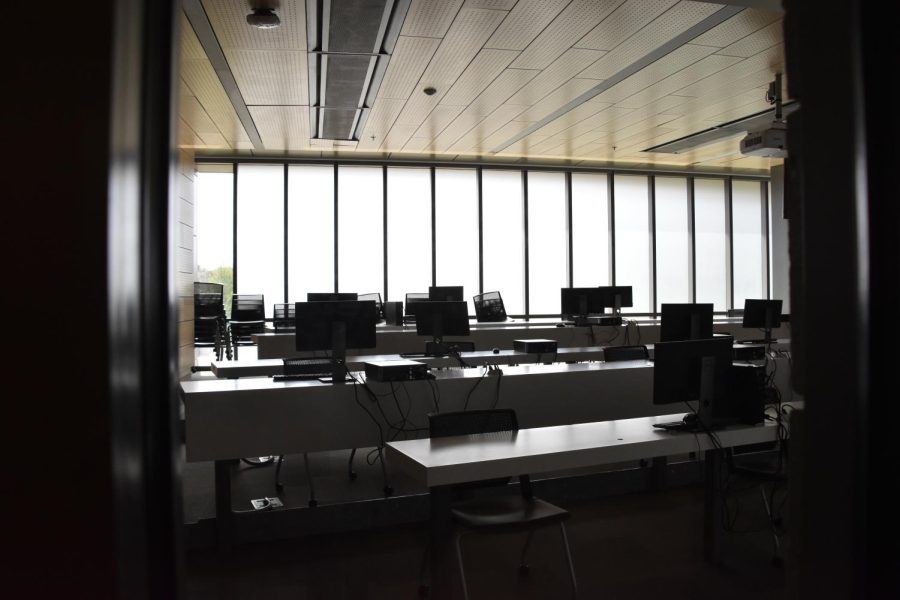OU faculty express concerns over course enrollment
Course enrollment concerns pile up as we head into the summer.
With registration for the Summer 2022, Fall 2022 and Winter 2023 semesters underway, Oakland University’s faculty has expressed concerns over problems surrounding enrollment and course cancellations for the upcoming year.
OU administration is changing their rules regarding enrollment and policies for classes. This rule change includes increasing the enrollment minimum for courses. If the minimum is not met during enrollment, these courses may be cancelled.
“The Provost Office announced changes to enrollment two weeks ago,” said Amy Pollard, executive director of OU’s Chapter of the American Association of University Professors (OU AAUP). “There are a lot of ripple effects … The big picture needs to be looked at before some of these rules are enacted.”
Department chairs are concerned about what the effect of cancelling some of these courses will have on students and their plans for enrolling in classes, graduation and their overall college experience.
There are also campus space concerns with both Varner Hall and South Foundation Hall under construction. With the construction, faculty worry that more classes will need to be offered online due to lack of space. Also, unwanted time slots for these classes, such as 8 a.m., are more common with this. Classes like these tend to have lower enrollment.
Additionally, the rule change results in the inability to offer a diverse curriculum. Courses that are popular tend to fill up quicker, and students may not see the courses they want.
Inclusive classes may have lower numbers, but are still necessary for certain degree programs. With these late changes, professors are working to finalize their summer plans.
“Enrollment is down. There’s no pretending that it isn’t. There are genuine financial concerns. How we deal with those financial concerns is really important,” Pollard said. “There is no final word yet. How do we make these changes in the correct lifetime but take into account the financial concerns of the university?”
According to OU AAUP President and History Professor Karen Miller, administration is insisting that the change is not as serious as faculty think it might be.
“Some programs aren’t significantly affected,” Miller said. “The university is trying to cut down on the number of sections available for us. Summer school classes were cancelled before registration began. We want to provide as efficient a ratio between students and faculty as we can. They don’t like running classes with small numbers of students, so we have this idea that classes are supposed to run at 80% capacity.”
The number of college-bound students is decreasing nationwide, which adds to the enrollment problem at OU.
Students in majors that do not have courses in a set order may be negatively affected. The courses that are not very popular could disappear, and many department chairs have expressed that it is important to keep these courses.
“If this were a five year plan, we could adjust. To have it just starting this summer, it’s like wait a minute, this is a course that’s only available every other year, and you want to cancel it? Maybe we should talk about this,” Miller said. “Right now I’m teaching a course that would’ve been cancelled with this rule. Next year I’m teaching a course in women’s history. I would hate to see it cancelled. I think it’s a course that people benefit from. College is a time where you can learn more about yourself and the world around you. I would like to see us foster that as much as we can.”











Marcus W. • May 4, 2022 at 1:26 PM
Financial concerns have very little to do with why enrollment is down. If finance was the issue, you would see enrollment dropping everywhere, not just at OU. Fact is, enrollment is dropping here because of the university’s president and board of trustees putting their own personal agendas over the best interests of the students. This gets manifested in many ways, but that is the bottom line.
I transferred to Wayne State last year. It wasn’t until the end of my first semester at Wayne that I realized just how much stress it caused me every semester wondering what idiotic ploy Pesco was going to come up with this time that would make it hard for me to get the classes I needed when I needed to get them. I don’t have that nagging dread in the back of my mind anymore, and that alone made the switch worth it.
Rob J. • May 6, 2022 at 9:19 AM
Actually, enrollment IS dropping everywhere. It is hardly due to internal politics as much as broader trends amongst college-going individuals.
https://www.mlive.com/news/2022/01/college-enrollment-decline-continues-in-michigan-though-two-year-institutions-rebounded.html
Anon • May 11, 2022 at 2:52 PM
Declining enrollment is a trend among college age individuals and OU’s administration has made decisions that have contributed to that decrease in enrollment at OU. They raised tuition during a pandemic, screwed over their faculty during contract negotiations, and have cut costs to the point where it impacted the quality of their educational materials. Pearson Education’s textbooks are poorly-made, expensive, and need personal passcodes to access the online materials, meaning you cannot save money by finding a pdf or using a used textbook. Cutting faculty and raising tuition for the next year is assuredly not going to help with the enrollment issue.